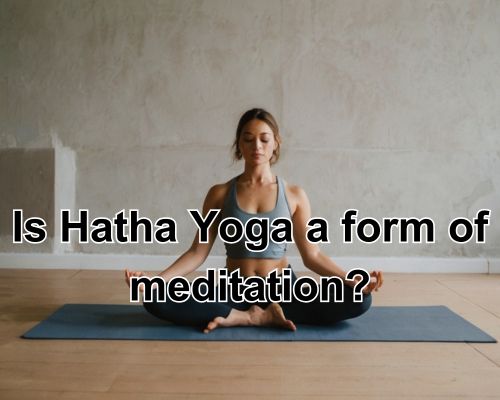
Is Hatha Yoga a Form of Meditation? Understanding the Connection in Mornington, Australia
Yoga and meditation are often considered two separate practices, but many people find themselves asking if Hatha Yoga, one of the most popular forms of yoga, can also be classified as a form of meditation. To answer this, we need to explore the key elements of both Hatha Yoga and meditation, and how they interconnect.

In Mornington, Australia, where people are increasingly embracing wellness practices, understanding the connection between Hatha Yoga and meditation can be a valuable insight for those interested in deepening their practice.
What is Hatha Yoga?
Hatha Yoga is a traditional form of yoga that focuses on physical postures (asanas) and breath control (pranayama). Derived from ancient Indian practices, Hatha Yoga aims to bring balance between the body and mind, making it a holistic approach to physical and mental health. The word “Hatha” is made up of two Sanskrit words: “Ha” meaning sun and “Tha” meaning moon. This reflects the balance of opposing energies and encourages harmony between the body’s physical elements.
Based on Jane Benson of Bikram Yoga Mornington, in Hatha Yoga, practitioners hold physical postures, stretch, and move through sequences with careful attention to breathing. The goal is to create physical strength, flexibility, and mental calmness. While many people practice Hatha Yoga primarily for its physical benefits, it also has a strong meditative component, which is often overlooked.
Meditation and Its Role in Yoga
Meditation is the practice of focused attention and awareness, often with the goal of achieving a state of inner peace and mental clarity. It involves quieting the mind and being fully present in the moment. While meditation can be done independently, it is also deeply integrated into many yoga practices, including Hatha Yoga.
In fact, one of the key benefits of yoga is its ability to prepare the body for meditation. By engaging in physical postures, the body is warmed up and released from tension, making it easier to sit in stillness for meditation. Breath control, an essential aspect of Hatha Yoga, is also directly tied to meditation, as it helps calm the nervous system and creates a relaxed state conducive to deep mental focus.
Is Hatha Yoga a Form of Meditation?
While Hatha Yoga is primarily focused on physical postures, it incorporates many principles of meditation. The slow, mindful movements and breath control in Hatha Yoga can create a meditative experience, particularly for those who practice yoga with a strong mental focus.
When you practice Hatha Yoga, you are training both the body and the mind. The process of moving through different asanas (yoga poses) and coordinating them with your breath is a form of moving meditation. Each time you focus your mind on your breath or the alignment of your body in a pose, you are engaging in a meditative process. For some practitioners, this can be as meditative as sitting in a quiet space, focusing on their breath.
In essence, Hatha Yoga has the potential to be a dynamic and active form of meditation. The practice involves being fully present and aware in each movement, which is at the core of meditation itself.
The Benefits of Combining Hatha Yoga and Meditation
When Hatha Yoga and meditation are practiced together, they complement each other in profound ways. Both practices offer numerous mental and physical health benefits. Some of the most common benefits include:
- Stress Relief: Both Hatha Yoga and meditation help to reduce stress. The physical movements and deep breathing involved in Hatha Yoga stimulate the parasympathetic nervous system, promoting relaxation. Meditation enhances this effect by encouraging mindfulness and reducing anxiety.
- Increased Mental Clarity: Hatha Yoga helps calm the mind by focusing attention on the present moment. Meditation further enhances mental clarity by quieting the mental chatter, allowing for deeper concentration and focus.
- Improved Flexibility and Strength: While meditation is often associated with mental benefits, the physical component of Hatha Yoga provides tangible benefits for the body. The practice strengthens muscles, increases flexibility, and improves posture, which also enhances overall physical health.
- Enhanced Self-Awareness: Both Hatha Yoga and meditation promote introspection and self-awareness. By engaging in these practices, individuals become more attuned to their thoughts, feelings, and bodily sensations. This increased self-awareness can lead to personal growth and emotional balance.
- Spiritual Growth: For many people, yoga and meditation serve as spiritual practices. By engaging in Hatha Yoga, practitioners may experience a deeper connection to themselves and the world around them, fostering spiritual well-being.
Why Hatha Yoga and Meditation Are Popular in Mornington, Australia
Mornington, located on the beautiful Mornington Peninsula in Victoria, Australia, is a popular spot for individuals seeking a lifestyle centered on well-being and relaxation. Known for its serene landscapes, beachside views, and natural beauty, it’s no wonder that many people in Mornington are turning to practices like Hatha Yoga and meditation to promote mental and physical health.
Local yoga studios in Mornington, such as Bikram Yoga Mornington and the Peninsula Yoga Centre, offer classes combining both Hatha Yoga and meditation techniques, catering to people of all experience levels. Whether you’re a beginner or an advanced practitioner, the peaceful environment of Mornington provides the perfect backdrop for embracing these wellness practices.
The region’s commitment to wellness and natural living makes it an ideal place to practice yoga and meditation. Whether you’re enjoying a quiet morning by the beach, hiking in the nearby national parks, or practicing at a local yoga studio, the calming atmosphere of Mornington encourages mindfulness, making it easier to experience the benefits of both Hatha Yoga and meditation.
Local Insights and Tips for Practicing Hatha Yoga and Meditation in Mornington
For those new to Hatha Yoga or meditation, Mornington offers a variety of resources. Beginners can start with a gentle Hatha Yoga class that emphasizes mindfulness and meditation. Many local studios also offer workshops that combine yoga with mindfulness meditation, teaching students how to integrate both practices into their daily lives.
- Find the Right Class: Look for yoga studios in Mornington that offer both Hatha Yoga and meditation sessions. Many classes focus on the therapeutic aspects of yoga, blending mindful movement with meditation to help you relax and rejuvenate.
- Utilize Nature for Practice: Mornington’s beautiful coastal landscapes make it an ideal place for outdoor yoga. Practice on the beach or in one of the region’s tranquil parks to enhance the meditative experience.
- Create a Home Practice: If you prefer practicing at home, you can create a dedicated space for yoga and meditation. Light candles, play calming music, and incorporate nature into your practice to set the mood for a peaceful session.
- Integrate Yoga and Meditation Daily: By combining both practices in your daily routine, you can experience the mental and physical benefits of each. Even just 15 to 20 minutes of Hatha Yoga followed by a brief meditation session can provide lasting benefits.
Conclusion
So, is Hatha Yoga a form of meditation? While it is primarily a physical practice, Hatha Yoga inherently contains meditative elements. Through breath control, mindfulness, and focused movement, Hatha Yoga can indeed be a dynamic form of meditation. When practiced in combination with meditation, it can offer profound benefits for the body, mind, and spirit.
For those in Mornington, Australia, integrating Hatha Yoga and meditation into your lifestyle can help promote stress relief, enhance mental clarity, and improve overall well-being. Whether you’re new to these practices or an experienced yogi, the serene environment of Mornington offers the perfect setting to experience the combined benefits of both yoga and meditation.


